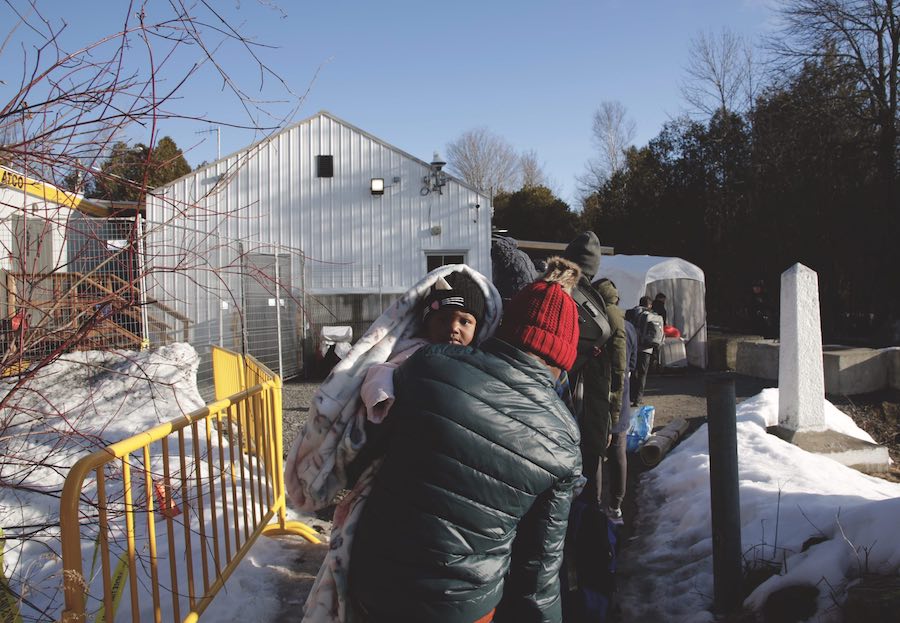Emilio Rodriguez, a refugee and migrant rights policy analyst at Citizens for Public Justice, explains the recent changes to the Canada-U.S. Safe Third Country Agreement that have closed unofficial border crossings like Roxham Road in Quebec. He spoke to Julie McGonegal about why human rights activists are alarmed.
Julie McGonegal: What is the Safe Third Country Agreement?
Emilio Rodriguez: It’s been in effect since December 2004 between Canada and the United States. Essentially, it declares the other country as safe for refugees. What this means for refugee claimants is that they then must apply for asylum in only one of the two countries. If they apply for asylum in both countries, one after the other, the claim will not be valid.
For example, if a person is in the United States and then crosses through a border into Canada and wants to claim asylum, the authorities at the border are entitled to turn that person back and demand that the person seek asylum in the United States as opposed to Canada.
There are some exceptions, but the agreement is quite expansive. It’s seeking to gain more control over the refugee claim process and to essentially put limits on the mobility of asylum seekers — and their ability to apply for asylum in either of those two countries.
JM: Tell me about the recent changes to the agreement.
ER: There was an additional protocol that was announced on March 24. It basically extended the agreement to irregular border crossings. Before the agreement, officials could turn away people going through regular border crossings. But if someone made an irregular border crossing through, for example, Roxham Road in Quebec, the officials in Canada still had to process the refugee claim.
Now, the additional protocol gives more power to officials to turn people back, even if they’ve crossed through an irregular border crossing.
The additional protocol to the Safe Third Country Agreement further limits the ability of asylum seekers to submit a refugee claim in Canada. If an individual does not have a family member in Canada, is not an unaccompanied minor, does not possess a valid Canadian visa or work permit, or is not within the “public interest” group (which is narrowly defined as someone who faces the death penalty in their country of origin or the United States), Canada is able to deport them to the United States without processing their claim.
More on Broadview:
- Religions on the rise: Islam, Hinduism and Sikhism are thriving in Canada
- Lawyer wants Canada to expedite resettlement for Afghan refugees
- Canada promised to resettle 40,000 Afghan refugees, but many are still waiting
This was already the case in official ports of entry but has now been extended to irregular border crossings as well. Evidently, this excludes thousands of people who are seeking protection from persecution.
There is this characterization of asylum seekers as queue-jumping — that they’re trying to get ahead of a perceived line and that they should just follow the normal processes. But refugee claimants follow an entirely different process than refugees resettled through sponsorship programs. So it’s not like refugee claimants are taking a spot from someone being sponsored. It’s also important for people to realize the magnitude of the numbers. In 2022, for example, Canada resettled around 75,000 of the over 100 million people worldwide who are forcibly displaced.
JM: Why are human rights activists concerned about the changes?
ER: The additional protocol creates more dangerous conditions for those who are desperately seeking refugee protection at the U.S.-Canada border. Faced with the threat of immediate deportation, asylum seekers may be pushed into more unsafe conditions as they enter Canada and wait for the 14-day period to end so that their refugee claims can be considered. It also signals a clear intention to continue limiting access to asylum in Canada, and contravenes the spirit of the 1951 Refugee Convention and other international agreements to which Canada is signatory.
JM: How are Canadian immigration detention centres affected by the changes to the Safe Third Country Agreement?
ER: In any given year, there are 6,000 to 9,000 people in immigration detention in Canada. And that’s certainly something we shouldn’t minimize. However, I think we do see higher rates of detention in the United States, and we do see aggravated conditions in U.S. detention centres. The best way to characterize it is that the United States does detain migrants and asylum seekers to high degrees.
But this needs to be said with a caveat. From a Canadian standpoint, we should be really self-critical. Canada hasn’t been so much better that we shouldn’t focus on the tensions here.
This interview has been edited and condensed for clarity and length.
***
Julie McGonegal is a writer and editor in Guelph, Ont.
This story first appeared in Broadview’s July/August 2023 issue with the title “What happened to Roxham Road?”
















They are not ‘irregular’ border crossings. That is a dumbed down euphemism. They are ILLEGAL! They need to get in line and apply like all other legal immigrants to Canada. Canada is a sovereign nation. Without borders and laws we do not have a country.